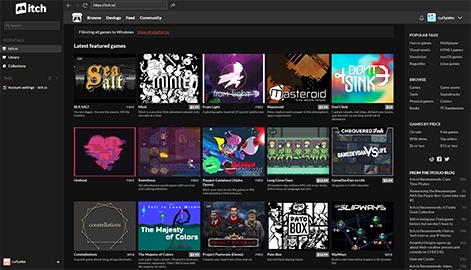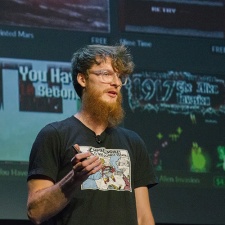It's been five years since Leaf Corcoran launched Itch.io, his vision of what a digital storefront for indies should look like.
The platform has been a success in some regards; it boasts 100,000 games, and certainly has real street cred with the indie development scene. But, by Corcoran's own admission, there is a lot of work to do. And, to his credit, Itch.io has already changed a great deal from Corcoran's initial vision in order to make life easier for developers.
"When I launched Itch.io, creators made their page and they could do whatever they want with it," he says.
"We wouldn't even list the games, there'd be no way to browse them, there was no promotion or community or anything like that. Part of the reason I did that is because at the time I was making some small games and I just wanted a landing page that would be up, having downloads, be fast and that was that. I didn't want to build a social network around games or build a huge a platform.
"As time went on, I started to realise that people liked our stance and what we were doing we have a voice in the industry among indies. It's good for us to take that and promote content. As the years go on, I have been developing a lot more features in terms of promoting content and giving people more channels to promote their work, changing how we do curation on the home page, changing how our browser pages work, trying to get as much traffic to the developers as possible.
"Internally, we have two metrics; we have internal refers and external refers. External means a developer posted a link on Twitter and someone clicked on it, which is nice and we get a tonne of that. But I'm trying to think about how we boost internally, how can I get repeat visitors to the Itch homepage to click, come back and buy. That's now very important. I used to be something I didn't think I'd do."

One way that Corcoran has mixed things up is introducing sales events. The firm's first site-wide sale was held at the end of last year.
"Doing promotions is a natural step," he says.
"We have built out all these tools for developers to very easily host sales, do bundles and what not. That's great. One of the things I learnt from that is that if you make these tools really easy, there's no organisation behind it, the developers see them and think they'll check it out later. We started realising that we need to hold their hand and give them reasons to use these features and give them reasons to push their games some more. That's when we started doing more seasonal stuff - bundles and sales."
[blockquoteOur brand is very strong with developers. I would say it's pretty weak with consumers
Two of the biggest topics facing the PC games marketplace right now are discoverability and curation. While Itch.io operates an open platform, much like Steam, its homepage curation is human.
"Curation is a challenge; human curation isn't a solution forever. We'll tweak things until we find a good thing all around," Corcoran explains.
"We look at the games a lot, we look for signals, we look for reasons to promote people's content and we try to just pick out games. It's important, but that's not everything we do. We get hundreds of games being uploaded daily, so we need to have an internal pipeline to organise this stuff and figure out what we're doing. If you consider something like Steam, they were closed for so long and are now more open, are they handling this new influx of games correctly? You'll see people complaining about the shovelware that is there and things like that. I like to think that because we were open from the beginning, that expectation isn't on us and so we can more freely experiment with how we curate and show things.
"People aren't coming to us and complaining and as we experiment with different curation things. Our homepage is mostly manually curated; we have two sections on the homepage - the featured stuff, which sticks around for a while and then there's fresh games. The Featured section is something we pick; games don't need to hit a certain level of sales. We look for stuff where the developer has made a nice page, they put effort into their game and it's something cool, we'll test it out. That's how we pick games This might scale up but it is interesting now and people like that. Then there's Fresh games. I wanted another way to bring in more experimental things, small things, and have a faster-moving section. That's what this Fresh games idea is. We have two tiers of curation where it's stuff that sticks around for a while, have some stuff with slightly bigger indies and stuff we think is pretty cool, and then there's interesting stuff that we give some time to on the home page."
One area that Itch.io needs to work on is its relationship with consumers. In a recent survey of GameMaker developers, 46.9 per cent of respondents said they'd publish their game on the platform, but just one per cent said they'd actually buy from it.
"Our brand is very strong with developers. I would say it's pretty weak with consumers. A lot of your average gamer might not know about Itch. They might have gone to it before and not realised it was Itch.io, because we have customised pages. It's a struggle," Corcoran admits.
"We are just working on things as ideas come. The reality is Steam is a major share. All the other ones are fighting over the scraps essentially. There's no surprise there that it is difficult. But as time goes on, things will change. There needs to be more places to buy games that people use all the time. Steam is only one window into the games world. It's a challenge but it's one we just have to work through."

Ultimately, Corcoran says that ultimately he envisions developers coming to Itch.io and there being a ready-made infrastructure to help developers get their game out there - and getting publicity, too.
"There is a big picture. I envision this pipeline where a developer comes on the platform, they are inexperienced with launching their game and there's lots they help with to make their launch the best that they can make it," he explains.
"Our primary goal, still, is that experience. Making sure they are correctly communicating what their game is, that they have the appropriate screenshots and other information there, but also giving them the chance to connect with streamers or press. There's so much that can be done with that pipeline, whether you're experienced or are brand new and don't know what you are doing and you're about to launch your game. There's tonnes of ideas in that space. Sure, that's not consumer-facing but I still think that's important and that's going to be our priority indefinitely."
The firm is also planning on relaunching its app, and introducing features so that developers can send codes to influencers and press in a safer manner.
"It's just refining the core experience," Corcoran says.
"We are going to be relaunching our app pretty soon. We're working on a new partner based system so people can share keys effectively with influencers. Press can create an authorised account, show they're a streamer or YouTuber or whatever. People pretending to be influencers is still a big problem even though sites have tried to solve it. There's still room to really help there."













